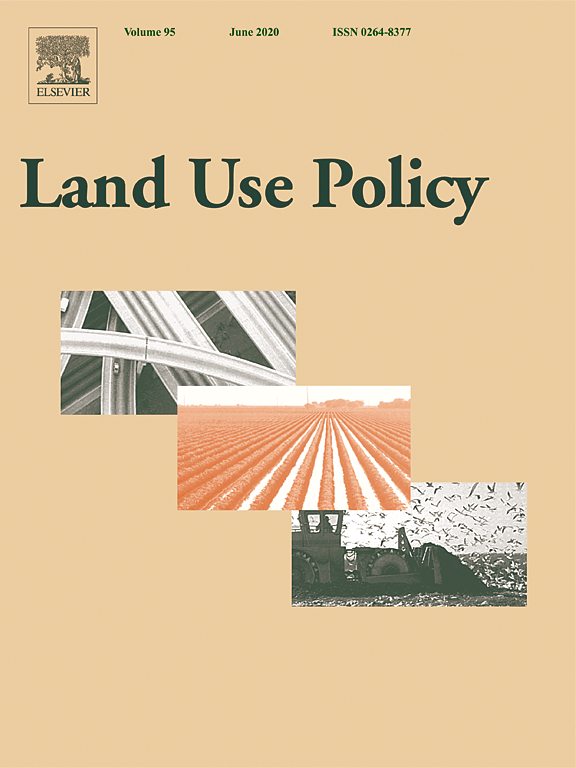Location
Land Use Policy is an international and interdisciplinary journal concerned with the social, economic, political, legal, physical and planning aspects of urban and rural land use. It provides a forum for the exchange of ideas and information from the diverse range of disciplines and interest groups which must be combined to formulate effective land use policies. The journal examines issues in geography, agriculture, forestry, irrigation, environmental conservation, housing, urban development and transport in both developed and developing countries through major refereed articles and shorter viewpoint pieces.
Land Use Policy aims to provide policy guidance to governments and planners and it is also a valuable teaching resource.
ISSN: 0264-8377
Members:
Resources
Displaying 121 - 125 of 279How Community-Based Rangeland Management Achieves Positive Social Outcomes In Mongolia: A Moderated Mediation Analysis
Evidence-based policy guidance necessary for addressing mixed outcomes of community-based rangeland management (CBRM) is limited, dominated by case studies, and lacking coverage of diverse ecological settings. In remedy, we studied 65 traditional neighborhoods and 77 formally-organized CBRM groups across four ecological zones and investigated how and when CBRM obtains greater social outcomes than non-CBRM neighborhoods.
Do farmers care about rented land? A multi-method study on land tenure and soil conservation
Does ownership status of agricultural land determine farmers’ soil use behaviour? Why (not)? We investigate this old question using multiple methods and data. We apply econometric analysis to plot-level data to determine whether planting decisions differ between rented and owned plots. In addition, we analyse interviews with Austrian farmers with the aim of explaining (a lack of) differences. We find a very small influence of tenancy on crop choice in the quantitative part of the study, and qualify these findings in the qualitative part.
Key landscape features in the provision of ecosystem services: Insights for management
Whereas ecosystem service research is increasingly being promoted in science and policy, the utilisation of ecosystem services knowledge remains largely underexplored for regional ecosystem management. To overcome the mere generation of knowledge and contribute to decision-making, scientists are facing the challenge of articulating specific implications of the ecosystem service approach for practical land use management.
Effects of historical land use and land pattern changes on soil erosion – Case studies from Lower Austria and Central Bohemia
This paper addresses changes in land use and in the spatial distribution of land units and their influence on the soil erosion risk in two areas with a different geomorphology and a different historical and political development: an intensively-used lowland agricultural watershed in central Bohemia, Czech Republic, and a partially hilly agricultural and wine-producing municipality in northern Austria.
Alternative use of wheat land to implement a potential wheat holiday as wheat blast control: In search of feasible crops in Bangladesh
The first occurrence of wheat blast in Bangladesh was confirmed in wheat (Triticum aestivum) fields in February 2016 and re-occurred in the subsequent years. This study explores the potential of alternative use of current wheat land as a strategy to combat the disease. Economically feasible alternative crops would need to be cultivated in the current wheat area by implementing a potential ‘wheat holiday’ – that is discontinuing wheat cultivation for a few years – be it in the 10 blast affected districts, in blast vulnerable districts or the entire country.



